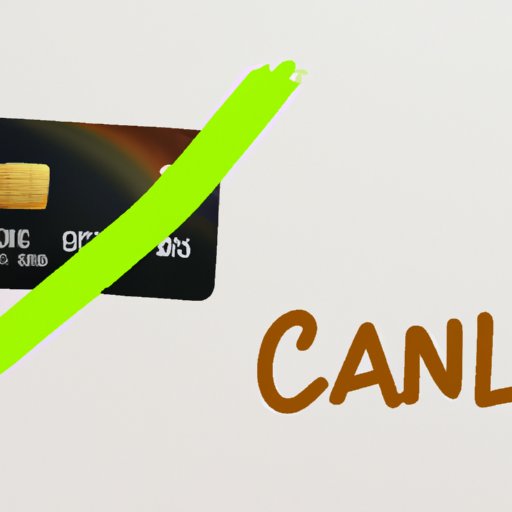
Introduction
Canceling a credit card can be an important decision for a variety of reasons, such as reducing debt or simplifying your finances. However, the process can be confusing if you’re not sure where to begin. This article provides a step-by-step guide to canceling a credit card, along with some dos and don’ts, video tutorial, and alternatives to consider.
Step-by-Step Guide
The first step towards canceling your credit card is to contact the credit card company. You can find the customer service phone number on the back of your credit card, on their website or on your billing statement. You should inform them that you wish to cancel your credit card and follow their instructions.
Once you are connected with a representative, they will ask you to verify your identity to ensure that no one is canceling your credit card without your consent. You may be asked to provide personal information such as your full name, Social Security number, card number, and other details to confirm your identity.
Next, you may need to notify any authorized users that the credit card has been canceled, especially if they are still using the card. It’s important to make sure that they stop using the card before the cancellation to prevent any further charges.
Before canceling the credit card, you will need to pay off any outstanding balance. If the balance is not paid, it can negatively impact your credit score and lead to additional fees. Make sure that you have a clear understanding of your account balance and payment due date to avoid missing a payment.
Once you have completed these steps, the credit card company will process your cancellation request and will confirm the cancellation date. It’s a good idea to ask for an email or written confirmation to keep a record of the cancellation.
If you’re unsure about the process, many credit card companies provide a detailed guide to canceling a credit card on their website. These guides often include additional information about how to cancel a credit card online and in-person.
Dos and Don’ts of Credit Card Cancellation
When canceling a credit card, there are several dos and don’ts that you should keep in mind. These tips will help you to make the right decision for your financial situation and avoid any pitfalls.
Do cancel your card if you are no longer using it. Unused credit cards can be a target for identity theft or fraudulent activity, and can also add to your overall debt-to-income ratio.
Don’t cancel your card if it will hurt your credit score. Canceling a credit card with a long credit history and high credit limit can negatively impact your credit score. Consider keeping the credit card open but not using it to maintain its longevity.
Do make sure to pay off any outstanding balance before cancellation to avoid additional fees and interest charges.
Don’t forget to notify any authorized users on your account. Authorized users can still use the card even if the primary cardholder cancel their credit card.
Sometimes, people do make mistakes while cancelling their credit cards. Some common mistakes to avoid include closing the oldest credit account, assuming that removing a credit card from a credit report will instantly improve their credit score, and canceling a card before getting rewards or points.
Video Tutorial
If you prefer a visual guide, a video tutorial on how to cancel a credit card online can be helpful. This video can provide clear instructions with a visual representation of the process.
Alternatives to Canceling a Credit Card
If you’re considering canceling your credit card, know that there are alternatives to consider before making a decision. In some cases, you may be able to downgrade or switch to a different credit card that better suits your needs without affecting your credit score. You can also request that your credit card issuer lower your interest rate or waive an annual fee.
It’s important to note that canceling a credit card will reduce your overall credit limit and can, in turn, affect your credit utilization ratio, which is the amount of debt you have relative to your credit limits. For this reason, it is not recommended to cancel your credit cards recklessly without considering the alternatives.
Tips for Researching and Evaluating Credit Card Cancellation
Before canceling your credit card, it’s important to research and evaluate your options. Start by reviewing your credit report and credit score to determine the impact that canceling your credit card will have on your credit utilization ratio. You may also want to research other credit cards with similar or better rewards or interest rates that fit your financial needs.
When evaluating credit card cancellation, consider the pros and cons of canceling a credit card. Some advantages of credit card cancellation include simplifying your finances, reducing credit card debt, and avoiding annual fees. However, the disadvantages can include a negative impact on credit score and reduced credit limit.
Conclusion
Canceling a credit card can be a daunting process, but it doesn’t have to be. By following the steps outlined in this article, you can ensure a smooth transition towards canceling your credit card while avoiding common mistakes. Remember to evaluate your alternatives before canceling a credit card and to stay informed about the impact it can have on your credit score. With a bit of research and planning, you can make the decision that is best for your financial health.





